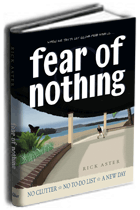If you have too many possessions or too many things to do, you know how easy it is to go too far. In principle, possessions and things to do are good to have, but you can end up with too many of them without knowing where they all came from. In the Shamanic Economist blog today, I write about what it means to go too far:
Going Too Far: Getting Past Minimizing and Maximizing
This idea applies especially in the area of personal possessions. Before the industrial age, when material possessions were rare and hard to come by, it was good to have as many material possessions as you could obtain. If many people have too many possessions now, it is because this is not such an easy pattern to break, even though, in a mass-production world, it no longer makes sense as a strategy.
If it is easy to go too far in gathering material possessions, it is also possible to go too far in removing them. You know you’ve gone too far in decluttering if you discover that you threw away several things yesterday that you need to have tomorrow. This is one of the reasons why I recommend a step-by-step, incremental approach to decluttering, not an all-out attack. Take away the 10 percent of your possessions that you are least likely to use or enjoy — or even 1 percent. Then you can repeat this five days later. Soon enough, you’ll have the possessions you actually use, and not too much more.
There is another area where people commonly go too far in decluttering that I must mention, and that is putting too much effort into maintaining the value of the possessions you no longer want. If it takes three hours to clean and give away a toaster oven, that is probably too much effort for the value it creates — unless, of course, the person who receives it is in desperate need of it. Similarly, if it takes weeks to sell a car for $350, that too is probably a disproportionate effort, if you could instead drive the car to a scrapyard and get $40 for it. As another example, having materials recycled may be a waste of fuel and time if you have to drive the materials to another county or ship them across the country to accomplish that. If you have many other things to do, then you often have to take the quick way out, and throw things away.



No comments:
Post a Comment